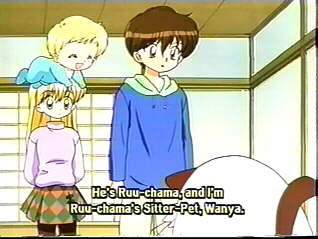|
||||||
Back | Anime titles | anime in romaji order | Shoujo | W.M.T | Old Anime | Manga titles | Blog Home
| Information | |
| Title (English) | Daa Daa Daa |
| Title (Japanese) | Daa! Daa! Daa! | Advertising Fantasy Novel |

|
| Notes | New NHK show, 2000. Based on shoujo manga of same title, by Mika Kawamura, serialised in "Nakayoshi" magazine. Scheduled to go 72 episodes. |
| Classification | shoujo |
| Synopsis | The heroine was a junior highschool girl and a daughter of a female astronaut.
Her mother and father go to the USA and she is left with her parents's friend,
at a Buddhist temple. To her surprise there was a boy of the same age there. She decided to go out of the house, but just then a strange small UFO appeared and was a baby inside. The baby thought of her as her mother and took to her. Also a cat-dog like animal appeared and introduced
the duo as a baby and his pet-sitter. Pet sitter was a creature created to nurse a baby. He explained that the they came from a planet 12 billion light year
away, and warped out here by the distortion of time-space. Also they wished to stay there for a while because their navigation system was broken. Then the strange 'family' builds up and many things will happen around them. - (CALCI) The story is about a boy, Kanata, and a girl, Miyu, who are both in their early teens and have stumbled upon an alien baby, Ruu-kun and his "sitter", Wanya. Ruu-kun is a very young baby who still can't walk or talk, but he can do all sorts of ESP-type tricks and fly like Ten-chan in Urusei Yatsura. But unlike Ten, Ruu is good natured. His sitter, Wanya, is a large, sentient cat who can talk. |
| Review | Dah! Dah! Dah! was based on the same titled manga, serially published
by monthly shojo manga Nakayoshi (remember that Card Captor Sakura came
from Nakayoshi, too). The story and outlook were quite shojo-ish. The plot and character design were quite typical shojo manga type, and targetted at the same audience as the original manga. It was not so distinctly made like Card Captor Sakura, but quite cheeful and fun. Recomended for shojo anime fans who are fond of Card Captor Sakura or Kaitou Saint Tail. Staff wise, the director was Sakurai Hiroaki, who was one of the collegue of Daichi Akitarou family. Ending theme was the cover version of TRF's 'Boy meets Girl' (Komuro Tetsuya). My overall evaluation of the first episode was B+. - (CALCI) The episode that I watched ( I believe it was the second ) had a certain "old-fashioned" feel about it due to the animation style ( somewhat early 90's ), the scarcity of background music and the character designs. The show was also slowly paced for the first part. But when a group of Miyu's friends came to visit the show livened up and became quite entertaining and cute. There's nothing particularly new or unique about "Da Da Da", but it all came together in an enjoyable way for me, so I will ask my friend to keep on sending this show. (Dave Baranyi) It's hard for TV stations to come up with new shows to replace popular shows. This is particularly hard if the station wants to keep the same audience entertained with something similar to the old show. Well, NHK appears to have pulled off this trick with its replacement for "Card Captor Sakura" - "Da! Da! Da!". NHK has successfully managed to adapt the shoujo manga by Mika Kawamura into a series which is aimed at a young audience but is entertaining for all audiences. "Da!Da! Da!" is the story of 14 year old Miyu, who finds herself having to live at an old temple with Kanata, a handsome classmate. But the usual high school hijinks are interrupted by the arrival of a small UFO containing Ruu, an alien baby boy who can fly and who has some telekinetic powers, and Wanya, his babysitter/toy who is sentient, looks like a large, fat stuffed cat and can temporarily transform into other shapes. Ruu and Wanya were caught up in a wandering black hole and are now a million light years away from their home, with no way to get back. So Miyu and Kanata take on the responsibility to take care of Ruu, and the ensuing complications in their lives make up the plot driver in the series. And "responsibility" is a key factor in the entire story line of the anime. As with "CCS", NHK has taken liberties with the original manga story line, characters and situations, in order to present something that is both entertaining and contains a "message" at the same time. And "responsibility" is that message. This starts right at the beginning of the show. Miyu's parents are space scientists and her Mom in particular wants to be an astronaut. Her parents have a chance to go to the US and join NASA, and Miyu would be a bit of an "inconvenience" there, so they plead with Miyu to, "let them have their life-long dreams come true". Saddled with this emotional blackmail, Miyu reluctantly acquiesces and goes off to live at the home of an old friend of her mother's. But that "home" turns out to be an old temple where Miyu's Mom's old friend is the resident priest who lives with his son Kanata, who will be a classmate of Miyu in her new school. This is bad enough, but the same day, Kanata's father gets an opportunity to study in India, and like Miyu's parents, begs that the two teens to, "let him have his life-long dream come true". The two teens again reluctantly agree and Kanata's father takes off immediately. So we have a role reversal here - the parents are acting immature and selfish and the teens have to make sacrifices and be mature about the situation. This continues when Ruu turns up. Wanya is nominally Ruu's babysitter, but Wanya is not really capable of taking care of Ruu in the absence of someone else in charge. So Miyu and Kanata have to take responsibility for Ruu, who is still too young to walk or say more than a couple of words. This becomes even more complicated because Ruu soon starts to call Miyu and Kanata "Mama" and "Papa". Kanata accepts the responsibility for Ruu fairly well, but Miyu is in a very uncomfortable situation. Ruu could be her child, and his insistence on calling Miyu "Mama" and Kanata "Papa" only makes things worse, particularly around Christine, the pretty but unpredictable classmate who has a big crush on Kanata and who sees Miyu as a rival. The first "season" worth of shows had many humorous episodes revolving around the problems that the two kids have, first to try to keep Ruu a secret, then to try to keep Ruu's alien origin secret once he is found out. Miyu claims Ruu as her younger brother, but Christine for one, is skeptical. Then things turn a bit more serious in the "second" season, particularly in a well crafted three-part story in which Ruu forces the issue of how his "Mama" and "Papa" treat him. Ruu notices how other parents behave with their children - the other parents hug, laugh with, caress their kids and share food with them. So Ruu wants the same treatment from Kanata and Miyu. Ruu also sees cases where parents fight over their kids, and he is scared that the spats between Miyu and Kanata mean that they will break apart too. So Ruu's confusion and worry cause him to cling even tighter to Kanata and Miyu. Kanata takes this in stride, but Miyu is not ready for this responsibility and tries to flee it, causing Ruu to become even more upset, and causing Miyu to feel guilty. The crisis comes to a head when Ruu's parents are able to send a noisy but recognizable holographic message to Ruu via his UFO/stroller. When Ruu first sees the image he is scared, and when his real parents call out to him, he flees into the arms of Kanata and Miyu, calling them "Mama" and "Papa". We see then that Ruu's parents resemble older versions of Kanata and Miyu. But the situation is resolved after Kanata and Miyu explain to Ruu's parents that they are attempting to care for Ruu, and Ruu's parents are grateful and accept that this is the best that can be done at the time, since they have no way to get to Ruu. Then Ruu calls both his real parents and Kanata and Miyu, "Mama" and "Papa", and everyone realizes that Ruu is also making the best of the situation, at which point the chance contact breaks off, leaving Miyu and Kanata alone with the responsibility for Ruu again. So, all-in-all, "Da! Da! Da!" is a thoughtful as well as entertaining series. For the most part it is lighter fare than the episodes that I've chosen to mention, but the underlying message remains the same - accepting responsibility for others is an important part of "growing up". Add to this well done mixing of simplicity and complexity in plot, subtly colorful animation, entertaining background music, interesting characters and brisk writing and direction, and you end up with a memorably enjoyable series. The later episodes of the series have begun to be repetitive and uninspired, particularly since the emphasis has shifted to alien characters rather than the humans. Still, all-in-all it's been an entertaining series. (Dave Baranyi) I've seen the first episode. It seems to be aimed at a fairly young audience, and while it's not bad, the designs aren't anythig special, and I'm not keen on "cute" infants, so this probably isn't a series I'll be following up. (GC) |
| Credits | director: Sakurai Hiroaki |
| Episodes | 78 |
| Release | It:TV |
| TV Showing | See the whole series for free? This series may be syndicated to regional cable, satellite or terrestial TV stations. For Europe click here. |
| Date | 2000 March 28 - 2002 February 26 |
| Production | JC Staff, NHK2 |
| Broadcaster | NHK |
| Animation | J.C. Staff |
| References & Help | Look up the latest data on this title at: Richard Llewellyn's Animated Divots, or Anime News Network (see Encyclopedia section) , or in "The Anime Encyclopedia" (Clements & McCarthy, Stone Bridge Press, 2001). Help & further information. |
|


